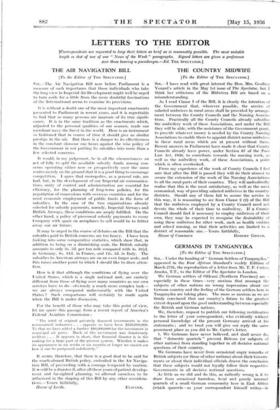LETTERS TO THE EDITOR
[Correspondents are requested to keep their letters as brief as is reasonably possible. The most suitable length is that of one of our " News of the Week" paragraphs. Signed letters are given a preference over those bearing a pseudonym.—Ed. TILE SPECTATOR.]
Sin,—The Air Navigation Bill now before Parliament is a measure of such importance that those individuals who take the long view in Imperial Air Development might well be urged to turn aside for a little from the more doubtful fascinations of the International arena to examine its provisions.
It is without a doubt one of the most important enactments presented to Parliament in recent years, and it is regrettable to had that so many persons are unaware of its true signifi- cance. It is in the same tradition as the enactments which, adjusted to the personal qualities of our seamen, made our merchant navy the finest in the world. Here is an instrument so fashioned that in course of time it should give us similar prestige in the air. But there is a danger to its effectiveness in the constant clamour one hears against the wise policy of the Government in not putting its subsidies into more than a few selected concerns.
It would, in my judgement, be in all the circumstances an act of folly to split the available subsidy funds among con- cerns operating either now or prospectively over the same routes merely on the ground that it is a good thing to encourage competition. I agree that monopolies, as a general rule, are bad, but, in the development of our Imperial air communica- tions, unity of control and administration are essential for efficiency, for the planning of long-term policies, for the negotiation of concessions with overseas countries and for the most economic employment of public funds in the form of subsidies. In the case of the two organisations already selected for subsidy payments, namely, Imperial Airways and British Airways, these conditions are amply fulfilled. On the other hand, a policy of piecemeal subsidy payrnents to every Company with space on aeroplanes to sell would be to fritter away our air future.
It may be urged in the course of debates on the Bill that the subsidies paid to British concerns are too heavy. I have been looking into some comparative statistics, which show that, in addition to being on a diminishing scale, the British subsidy amounts to only 3s. 3d. per ton mile compared with 4s. 10id. in Germany, 8s. 11d. in France, and Its. 5d. in Italy. The subsidies to American airways are on an even larger scale, and this raises another point to which I should like to draw atten- tion.
How is it that although the conditions of flying over the United States, which is a single national unit, are entirely different from those of flying over many countries as our own services have to do—obviously a much more complex task— we are always compared unfavourably with the United States ? Such comparisons will certainly be made again when the Bill is under discussion.
For the benefit of those who may take this point of view, let me quote this passage from a recent report of America's Federal Aviation Commission :
" The total of original privately financed investments in the aeronautical industries . . . appears to have been $550,000,000. To that wo have added a further S90,000,000 for the investment in municipal air ports. Much of tho investment was disastrously reckless . . . It appears in short, that financial disaster is in the making for a large part of the present system. Whether it makes its appearance in six weeks or six months or longer we cannot see bow it can he postponed indefinitely."
It seems, therefore, that there is a good deal to be said for the much-abused British policy, embodied in the Air Naviga- tion Bill, of proceeding with a courage tempered by caution. It would be a disaster if, after all these years of patient develop- ment and far-sighted planning, we allowed ourselves to be influenced in the shaping of this Bill by any other considera- tions.—Yours faithfully,






















































 Previous page
Previous page